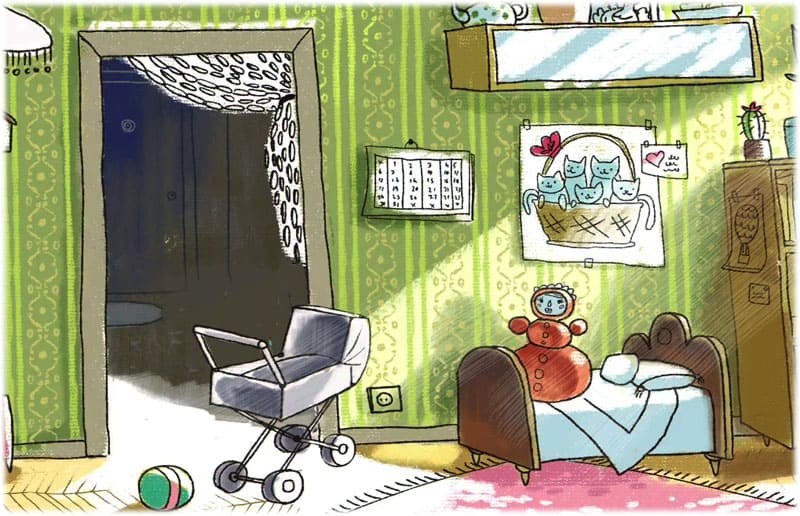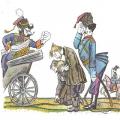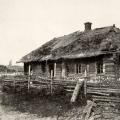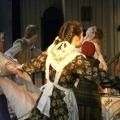Analysis of Shukshin's story "Crank
In his works, Shukshin often used images of ordinary people. He looked for them among the people. Most often he was interested in unusual images. Despite the fact that they were not immediately clear to many, they were distinguished by their closeness to the Russian people. It was this image that we could see when studying the story of Shukshin Chudik. And in order to get acquainted with its meaning and understand what the story of Vasily Shukshin teaches, we offer it and.
Brief retelling of the plot
If we talk briefly about the plot, then at the very beginning we get acquainted with Vasily Egorovich Knyazev. However, Knyazev's wife often calls her husband simply - Chudik. The peculiarity of this person is the eternal stories in which he fell. Something constantly happens to Chudik, and now he decides to go to his brother in the Urals. Chudik had been planning this trip for a long time, because for twelve whole years he had not seen his own blood. The trip was accomplished, but it was not without adventures.
So, at the beginning of his journey, Chudik decides to buy gifts for his nephews. There, in the store, he saw a banknote of fifty rubles, and he believes that someone dropped it. But he did not dare to raise other people's money. The only problem is, the money turned out to be his. Unable to overcome himself in order to take the money, he goes home to withdraw money from the book again. Naturally, at home he gets a scolding from his wife.
The following situation happened to the hero when he was flying in an airplane. For certain reasons, the plane has to land not on the runway, but in an open field. Here, the neighbor, who was sitting next to the Chudik, from experience and from shaking, his jaw falls out. The hero wants to help and raises his false jaw, for which he receives not gratitude, but a statement. Another would have answered or been offended, and our Chudik also invites his neighbor on the trip to visit his brother to boil his jaw there. This self-confident person did not expect such a reaction, and then the telegraph operator orders to change the text of the telegram that Chudik wants to send to his wife.

In his brother's house, Vasily feels the hostility that comes from his daughter-in-law. She despises the villagers, even though she herself comes from the village. However, he wants to forget everything rural in every possible way in order to be completely considered urban. So he treats the villager Vasily with hostility. The brothers have to go outside and reminisce there.

In the morning, Chudik found that he was alone at home. In order to somehow soften his brother's wife, he decides to decorate the stroller by painting it. Then I went for a walk around the city. He returned only in the evening and saw how the husband and wife were arguing. The reason was him and the painted carriage. In order not to annoy the daughter-in-law any more, Chudik goes back home. This caused heartache to the hero, and in order to somehow find peace of mind, he wanted to walk barefoot on the ground, which was wet from the steamy rain.
The main characters of the story Chudik
The main character of Shukshin's story is the thirty-nine-year-old Chudik. That is what his wife calls him, even though from birth his name is Vasily. The image of the hero is unsophisticated and simple. This is a man who did not dare to take his money, considering it to be someone else's, and put it on the counter. And when he discovered that it was his banknote, he did not dare to return for them. He is afraid that the queue will consider that he takes someone else's.
It was strange for him that he always evoked an ambiguous reaction from people with his sincerity and openness, although in his opinion he always behaved naturally. But the trouble was that people had already become closed for a long time and were not used to this. The main character Chudik always does what his heart tells him and he considers this decision to be the right one. By the way, the author uses the image of a villager for a reason, because the author is sure that only people from the outback have such qualities as naivety, kindness, sincerity, which city dwellers have long forgotten about.
 “Lefty” - a summary of the work N
“Lefty” - a summary of the work N Turgenev, "Biryuk": a summary
Turgenev, "Biryuk": a summary Comedy A.N. Ostrovsky "Poverty is not a vice": a summary of the work
Comedy A.N. Ostrovsky "Poverty is not a vice": a summary of the work